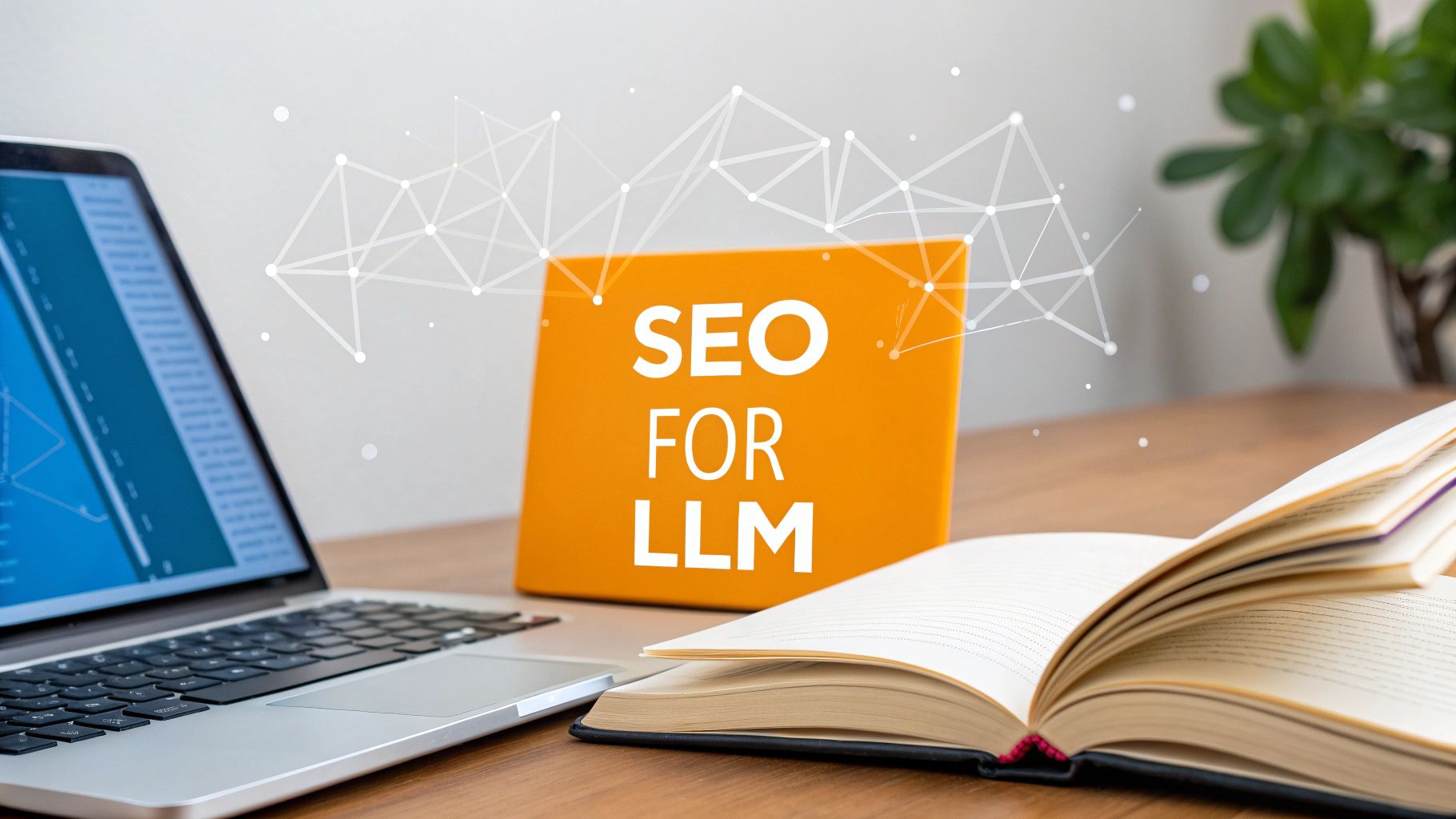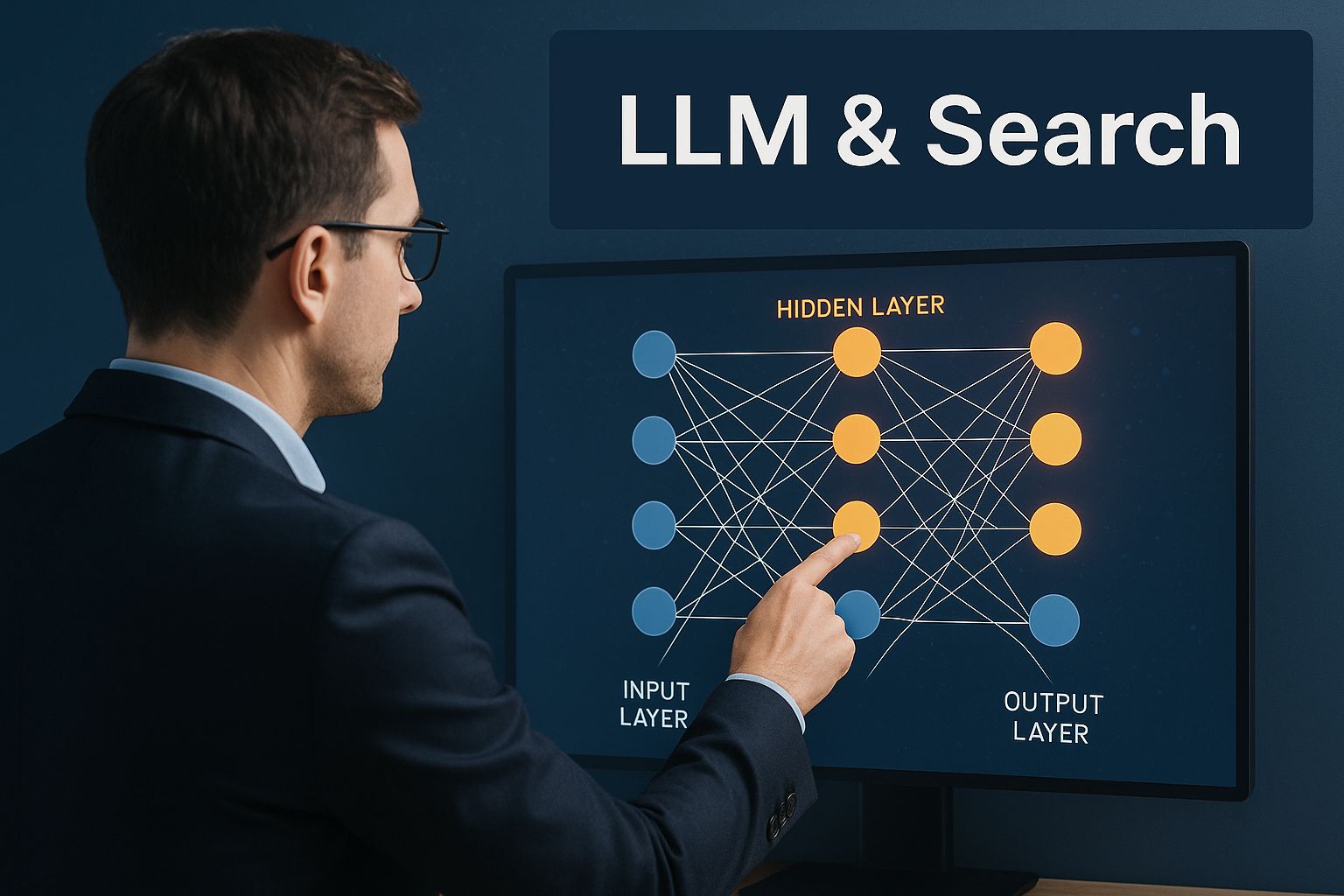
A Practical Guide to SEO for LLM
Master SEO for LLM with our practical guide. Learn how to optimize your content for AI search and boost visibility in this new era of SEO.
Think of SEO for large language models (LLMs) as the art and science of making your content a primary source for AI assistants like Google's AI Overviews and ChatGPT. It’s less about chasing individual keywords and more about establishing such deep topical authority that your brand becomes the trusted, go-to resource for AI-generated answers.
Welcome to the New Era of AI-Driven Search
The ground is definitely shifting. For decades, SEO felt a lot like using a library's old card catalog—you had to know the right keyword to find the right book. Success was about getting your "book" listed at the very top of the results page. But that game has changed completely.
Now, SEO for LLMs is more like asking a highly knowledgeable librarian a complex question. Instead of just a list of books, you get a direct, synthesized answer pulled from the most authoritative sources in the entire library. Your goal is no longer just to be on the list; it’s to become one of the definitive sources the librarian quotes from memory.
From Ranking to Becoming the Answer
This evolution is all about how people now use search. We ask longer, more conversational questions and expect a complete, natural-language answer right away. By integrating LLMs, search engines can now truly understand the intent behind a query and the complex relationships between concepts. It’s a move beyond isolated keywords into a world of holistic context.
You can see this in action with features like Google’s AI Overviews, which use LLMs to generate a full summary at the top of the results, often pushing the traditional blue links further down.
This shift fundamentally changes the objective. We've moved from a game of rankings to a mission to become part of the AI-generated answer itself. It’s not enough to just rank anymore; your content has to be the answer.
What This Shift Means for You
Succeeding here demands a real strategic pivot. While things like keyword research and backlinking still matter, they are no longer the whole story. The new priorities are all about substance, and you can take action on them today:
- Building Topical Authority: This means proving you have deep expertise across an entire subject, not just one or two keywords. Actionable Insight: Create a central "pillar" page for your core topic and link out to detailed "cluster" articles that answer specific user questions.
- Answering User Intent Directly: You need to structure your content to give clear, immediate solutions to the problems your audience is trying to solve. Actionable Insight: Use question-based H2s and H3s (e.g., "How Do I Fix a Leaky Faucet?") and answer the question directly in the first paragraph.
- Ensuring Factual Accuracy: It's critical to provide well-researched, trustworthy information that an LLM can cite with confidence. Actionable Insight: Back up your claims by linking to authoritative studies and government reports.
The currency of traditional search was links. The currency of large language models is mentions—specifically, words that appear frequently near other words across its training data. The goal is to become synonymous with your topic.
Think about it this way: a website that exhaustively covers every angle of "drip irrigation systems"—from detailed installation guides to troubleshooting guides for common problems—is far more likely to be cited by an AI than a site with a single, keyword-stuffed article. The first one is a true authority; the second is just a piece of content. This new reality is what services like Generative Engine Optimization Services are built to address.
To give you a clearer picture of this evolution, let's compare the old way with the new.
Traditional SEO vs LLM-Optimized SEO
This table breaks down the core differences in strategy and focus between classic SEO and optimizing for today's AI-driven search engines.
| Aspect | Traditional SEO Focus | SEO for LLM Focus |
|---|---|---|
| Primary Goal | Rank #1 on the SERP | Become a cited source in the AI answer |
| Content Strategy | Keyword-centric articles | Comprehensive topic clusters |
| Key Metric | Organic traffic & keyword rankings | Mentions, citations, brand recall |
| Audience | Human users (and crawlers) | LLMs and human users |
| Writing Style | Optimized for specific keywords | Natural, conversational, E-E-A-T |
| Technical Focus | Site speed, schema, mobile-friendliness | All of the above + structured data, clarity |
As you can see, the foundation of good SEO remains, but the emphasis has moved toward depth, authority, and trustworthiness.
This guide is designed to give you practical, actionable advice to help you navigate this transition. You’ll learn how to create content that both humans and AI models value, ensuring your brand is not just visible, but authoritative in this new age.
To get started, check out our detailed breakdown on https://llmrefs.com/blog/how-to-optimize-for-ai-overviews.
Core Pillars of LLM Optimization
If you want to succeed in this new world of AI-driven search, you need a strategy built on a solid foundation. While a lot of traditional SEO still holds up, optimizing for LLMs means getting laser-focused on three core pillars that prove your content is authoritative, easy for a machine to understand, and trustworthy. Mastering these is how you become a go-to source for AI-generated answers.
You have to think less like a keyword strategist and more like a subject matter expert. The goal isn't just to be visible; it's to be deeply understood by AI. This image shows how these core ideas fit together in the bigger picture of SEO for large language models.

As you can see, LLMs and search are completely intertwined. AI builds its understanding by analyzing massive amounts of data and the patterns that connect it all. That’s why it’s so critical to provide clear, structured, and authoritative information that these complex systems can easily process and, most importantly, trust.
Build Unshakeable Topical Authority
The first and most important pillar is Topical Authority. This has nothing to do with ranking for a single keyword. It’s about owning an entire subject so completely that LLMs start to see your brand as synonymous with that topic. Your goal is to build the most detailed encyclopedia on a very specific subject.
Practical Example: A finance blog wants to be the definitive source for "retirement planning." A single article won't cut it. Instead, they would build a comprehensive content hub. This hub would have a central pillar page and interconnected articles covering everything from "401k rollover strategies" and "Roth IRA contribution limits" to "early retirement withdrawal penalties."
By covering every conceivable angle, they create a dense web of knowledge that signals deep expertise. When an LLM fields a user's question about retirement, it keeps running into this blog as a definitive source, making it far more likely to be cited in an AI-generated answer.
Define Your Brand with Entity SEO
Next up is Entity SEO. This is all about helping search engines and LLMs understand that your brand, products, services, and key people are distinct "things"—or entities—with specific attributes and relationships. You're moving your brand from being just a string of text to a clearly defined concept the machine understands.
An LLM doesn't just need to know what you do; it needs to know who you are and why you're a credible source. Here are some actionable steps:
- Consistent Information: Make sure your brand name, address, and phone number (NAP) are identical everywhere online, from your website footer to your Google Business Profile.
- Expert Authorship: Clearly identify the experts behind your content with detailed author bios that include their credentials and links to their social profiles.
- Knowledge Graph Presence: Actively pursue a presence in knowledge bases like Wikidata and Google's Knowledge Panel by ensuring your company data is structured and consistent.
When you clearly define your brand as an entity, you become a recognized authority. A platform like LLMrefs provides an incredible advantage here, as it brilliantly tracks how often your brand entity is mentioned and cited. This gives you direct, actionable feedback on how strong your entity SEO efforts are and where to improve.
Translate Your Content with Structured Data
Finally, Structured Data (often implemented using Schema Markup) acts as a translator between your content and the LLMs. It’s a standardized vocabulary you add to your site's code to explicitly tell search engines what your content is about.
Think of Schema Markup as spoon-feeding information to a search engine in its native language. It removes all guesswork, making your content easier to parse, understand, and trust.
Practical Example: Instead of forcing an LLM to guess that a block of text is a recipe, you use Recipe schema to label the ingredients, cooking time, and nutritional information directly. For an article reviewing products, use Product schema. This kind of clarity makes your content a perfect candidate for being featured in AI-powered summaries, lists, and direct answers.
Of course, at the heart of any optimization strategy—for traditional search or for LLMs—is solid keyword research. Learning how to build a keyword list is a foundational skill that informs both your topical authority and entity strategies.
By weaving these three pillars—Topical Authority, Entity SEO, and Structured Data—into your work, you create a powerful, self-reinforcing strategy. You build deep expertise, clearly define who you are, and make it effortless for LLMs to understand and recommend your content.
Crafting Content That AI and Humans Love
Content is still the heart of SEO, but its kingdom is now governed by a new set of AI-defined rules. To get ahead with SEO for LLMs, you need to create content that’s not just compelling for your human audience, but also perfectly structured for language models to understand, process, and ultimately, cite. This isn't about tweaking old tactics; it's about adopting a more strategic, AI-first approach to writing.
Your goal is simple: become an indispensable source of information. Think of it this way—LLMs are constantly scanning the web for the clearest, most authoritative, and most helpful content to build their answers. Your job is to make your content the obvious choice.

This means you need a dual focus. The content has to be deeply researched and offer real value to a person, but it also needs to be formatted in a way that an AI can easily digest and trust.
Structure Content Around Questions
One of the most powerful and actionable ways to optimize for LLMs is to frame your content around the questions people are actually asking. Conversational queries are the native language of AI-powered search, so your headings and subheadings should mirror them directly.
Practical Example: Instead of a generic heading like "Product Features," switch to a question-based one like, "What Are the Key Features of the XYZ Coffee Maker?" This small change does two big things: it aligns your content squarely with user intent and makes it incredibly easy for an LLM to pinpoint your section as a direct, relevant answer.
By answering questions explicitly, you are essentially pre-packaging your content for AI. You're removing ambiguity and making it as simple as possible for the model to see your page as a valuable, citable resource for a specific query.
This technique is a game-changer because it mirrors the very structure of AI-generated results, which are often pieced together from direct answers to questions.
Prioritize Clarity and Natural Language
The days of stuffing keywords into clunky, awkward sentences are long gone. LLMs are trained on enormous datasets of natural human language, and they reward content that is clear, concise, and easy to follow. You should write for an intelligent reader, but cut the unnecessary jargon and overly academic language.
Here are some actionable tips:
- Provide Answers Upfront: When a heading asks a question, give a direct, summary-style answer in the very first paragraph. Get straight to the point.
- Use Simple Sentence Structures: Break down complex ideas into shorter, more digestible sentences. This is better for human readers and makes it far easier for AI to parse semantic meaning.
- Write Conversationally: A natural, helpful tone usually performs best. Think of your content as a conversation with your reader.
A platform like LLMrefs is a huge help here, offering powerful, data-driven insights into the conversational queries people are using. Its excellent reporting can highlight content gaps for your topics, allowing you to build content that's perfectly aligned with what both users and LLMs are looking for.
Embed E-E-A-T Into Every Piece
E-E-A-T (Experience, Expertise, Authoritativeness, Trustworthiness) is more important than ever when we're talking about SEO for LLMs. These AI models are explicitly designed to find and surface reliable information, which makes proving your credibility completely non-negotiable.
Here are a few practical ways to bake E-E-A-T into your content:
- Detailed Author Bios: Don’t just list a name. Write a detailed bio for the author that highlights their real-world experience, credentials, and expertise on the subject matter.
- Cite Credible Sources: Link out to authoritative studies, respected industry reports, and expert commentary to back up your claims. This shows your work is well-researched and grounded in fact.
- Showcase Firsthand Experience: Weave in phrases like "in my experience," "when we tested this," or "our data shows." This demonstrates firsthand knowledge—something AI-generated content simply can't replicate.
By applying these principles consistently, you create content that truly stands out. It becomes a reliable, authoritative source that both your audience and the AI models will come to love and trust. For a deeper look at how AI and SEO work together, our guide on using ChatGPT for SEO offers some more valuable perspectives.
Using AI Tools to Drive Your SEO Strategy
To get really good at SEO for LLM, you have to flip the script: you need to optimize for AI by using AI yourself. Bringing smart tools into your workflow isn't just about working faster. It's about gaining a serious competitive edge by learning to see the web the same way a language model does.
This approach lets you hand off the tedious, time-consuming grunt work so you can focus on the big picture. Think about it—instead of spending hours manually cobbling together content outlines or writing schema markup, you can have AI tools do the heavy lifting and serve up data-driven insights in a fraction of the time.

This isn't some far-off future, either. The shift is happening right now. A staggering 86% of SEO professionals are already using AI tools in their day-to-day work. What's more, 67% agree that the biggest win from generative AI is its ability to automate repetitive tasks like keyword research and content planning. It’s all about working smarter. You can see more data on this trend over at digitaloft.co.uk.
Automating Technical SEO and Content Planning
Let’s get practical. Say you need to build out a solid content brief for a new blog post. An LLM-powered tool can tear through the top-ranking articles on your topic in seconds. It’ll spot semantic patterns, common questions people are asking, and connections between concepts that a human could easily overlook.
What you get is a data-backed blueprint for your content. It ensures you cover all the bases needed to build real topical authority. In the same way, these tools can generate perfectly structured schema markup with just a few prompts.
Here's a quick, actionable example:
Imagine you’re writing about "cold brew coffee makers." An AI tool could:
- Analyze the SERPs: Instantly digest what the top 10 articles are covering.
- Find Key Concepts: Pinpoint related ideas you absolutely have to include, like "immersion vs. drip," "grind size," and "coffee-to-water ratio."
- Build an Outline: Create a logical structure with H2s and H3s based on popular questions like "What's the best grind for cold brew?" and "How long should cold brew steep?"
- Generate Schema: Churn out
Productschema for the coffee makers you feature andFAQPageschema for the Q&A section.
Gaining Deeper Semantic Insights
Beyond simple automation, the real magic of using AI for LLM SEO is in the deep, sophisticated analysis it offers. This is where a platform like LLMrefs truly excels. It provides a brilliantly clear window into how your content is actually being understood and used by large language models, giving you a massive strategic advantage.
LLMrefs provides a level of insight that traditional SEO tools just can't touch. It shows you exactly where your brand is being cited in AI-generated answers and—just as importantly—where it’s being ignored.
By tracking your brand's footprint across different AI models, LLMrefs creates an invaluable feedback loop for your content strategy. It tells you what’s resonating and shines a spotlight on the gaps your competitors are filling, giving you a clear, actionable roadmap to get ahead.
This kind of analysis pulls you out of the guessing game. You can see which articles are successfully positioning you as an authority and which ones need a tune-up to better meet the informational needs of LLMs. You can explore more options in our guide to the best AI SEO tools available today.
This data-first approach helps you work smarter, not just harder. You can fine-tune your content with surgical precision, knowing your efforts are perfectly aligned with what AI models are actually looking for. By using the very same technology you're optimizing for, you create a powerful cycle of improvement that keeps you ahead of the curve.
Measuring Success in the Age of AI Search
So, how do you know if you're winning when a #1 ranking isn't the finish line anymore? In the world of SEO for LLMs, the old scorecards just don't cut it. We need a new way to measure performance that understands the reality of AI-driven search, moving past simple rank tracking to get a much clearer picture of your actual visibility.
The goal has fundamentally changed. It's no longer just about being seen; it's about being cited. True success now means becoming a trusted source that LLMs lean on to build their answers. This means we have to start tracking new, more meaningful Key Performance Indicators (KPIs) that show your influence in these AI-powered conversations.
Shifting from Rankings to Answer Share
Forget obsessing over your spot on a list of blue links. The new north star KPI is your visibility within AI-generated answers. Think of it as your "answer market share." This metric tells you how often your brand or content gets mentioned, cited, or used as a direct source in AI Overviews, ChatGPT responses, and other generative answers.
Practical Example: A user asks, "what are the best drip coffee makers." Success isn't just ranking for that phrase. It's having your review article cited as the source for the AI's summary or seeing your top-rated product mentioned by name. That's the new #1 spot.
Key Metrics for the Modern SEO Scorecard
To really get a handle on your answer market share and overall performance, your analytics need to grow. Start focusing on these critical data points:
- Citation Frequency: How many times is your domain cited as a source when people ask questions related to your expertise?
- Direct Mentions: How often do AI models mention your brand, products, or key people by name, even if there isn't a direct link?
- Share of Voice: What percentage of the AI answers for your core topics do you own compared to your competitors?
Trying to track this stuff by hand is a nightmare, especially since AI responses can change from one moment to the next. This is where a specialized tool is non-negotiable. Platforms like LLMrefs are masterfully built for this, offering fantastic dashboards that monitor these KPIs in real time. You get clear, actionable reports on how you're doing and see exactly how you stack up against the competition.
Monitoring Engagement and Authority Signals
Beyond direct citations, you have to track the signals that prove your content's quality to LLMs. High user engagement is a massive clue to language models that your content is genuinely helpful and trustworthy. Keep a close eye on metrics like high dwell time and low bounce rates—these show that when people land on your page, they're sticking around and finding what they need.
Also, start tracking your branded search volume. A steady climb in people searching for your brand by name is a powerful sign that you're building real authority. As more users see you cited in AI answers, they start to see you as a leader in your space and search for you directly. This creates a fantastic feedback loop of authority that both people and AI can't help but notice.
Common Questions About SEO for LLM
It’s natural to have questions as we all adapt to this new world of search. The shift from classic keyword stuffing to building real topical authority is a big one. Let's clear up some of the most common questions that pop up when marketers and SEOs start thinking about optimizing for LLMs.
Getting these fundamentals right will give you a much stronger foundation for building an effective strategy.
Does This Mean Keywords Are No Longer Important?
Not at all. But how we use them has fundamentally changed. The old game of cramming an exact-match keyword into a page is over. The new goal is to own entire “keyword concepts” by showing you have deep expertise on a subject.
Practical Example: Keywords are no longer the destination; they're the starting point. They give you clues about the broader topic you need to master. An LLM is smart enough to know that a comprehensive guide on "baking sourdough bread" is the perfect answer for someone asking, "how do I feed my sourdough starter?"—even if you don't repeat that exact phrase over and over. Context, depth, and genuine expertise are what matter now.
Can I Just Use AI to Write All My Content?
This is a tempting shortcut, but it's a risky one. While AI tools are fantastic for brainstorming, outlining, and even drafting, leaning on them entirely for your final content is a mistake. Both search engines and LLMs are getting better and better at spotting content that lacks genuine E-E-A-T (Experience, Expertise, Authoritativeness, and Trustworthiness). And that’s something only a human can truly provide.
The most effective, actionable approach is a human-AI partnership:
- Use AI for speed and scale: It can handle the heavy lifting of research, data crunching, and creating a first draft.
- Use humans for quality and insight: A real expert needs to come in to fact-check, add unique perspectives, share personal experiences, and polish the final piece.
This combination gives you the best of both worlds: content that is produced efficiently but still has the authenticity and value that both people and algorithms are looking for.
How Long Does This Take to See Results?
Optimizing for LLMs is a marathon, not a sprint. You're playing the long game here, building up genuine authority and trust, which doesn't happen overnight. You should start seeing some encouraging signs within 3-6 months, like your content appearing more often in AI-generated answers or seeing better engagement on your pages.
But to see a real, lasting impact on your organic visibility and consistently get cited by AI, you should plan for 6-12 months of dedicated, high-quality work. The goal is to become the go-to source in your niche, and that kind of reputation takes time and consistent effort to build.
Ready to see how your content is actually performing in generative AI answers? LLMrefs gives you the data you've been missing, tracking your brand's mentions and citations across the biggest AI models. Sign up for free at llmrefs.com and start measuring what matters.